

Activity Report: The Tafakkur ICCS-NYCU Muslim Film Festival Day 3
2022-02-09
The Tafakkur ICCS-NYCU Muslim Film Festival Day 3-REPORT
Date: 2021/10/24
Venue: Zoom webinar
Text / Irfan Muhammad (M.A. Student at IACS-UST at NYCU)
The struggle of the Palestinian people against Israeli colonialism is still going on. Recently, solidarity for Palestine's independence has become increasingly echoed throughout the world. The solution offered to bridge between Palestine and Israel by far is a two-state solution. However, this solution is also widely opposed because Israel has straddled many peace agreements by continuing to annex Palestinian territories.
Regarding this, Prof. Bao Hsiu-Ping said the one-state solution could be an alternative. In his presentation entitled "The Idea of Liberation: Beginning and Methods", Prof. Bao from the Department of History, National Chi Nan University said the idea of a one-state solution refers to having Palestinians and Jews building one nation-state together. To fulfil this, the process of decolonization is needed to erase Zionism, the root of the ideology of the state of Israel.
In Prof. Bao’s opinion, the idea of a one-state solution was born from the never reaching the idea of a two-state solution. On paper, the Peace Process between Palestine represented by the Palestine Liberation Organization (PLO) and Israel in 1993 decided that Israel should withdraw from Gaza and the West Bank and let the area be managed by the Palestinian Authority (PA). The PA and Israel have also negotiated on controversial issues such as the status of Jerusalem, the return of Palestinian refugees, the abolition of the Jewish population, and security and borders.
In the beginning, the majority of Palestinians and Israelis supported this idea. However, in reality, based on Oslo II September 1995, the West Bank was instead divided into three areas. Area A (18%) is under the control of the PA, Area C (60%) is managed by Israel and Area B (22%) is jointly controlled by the PA and Israel.
Meanwhile, in East Jerusalem and the West Bank, Israel also built Jewish settlements for religious and strategic considerations. These Jewish settlements violate international law, but Israel continues to expand its number of Jewish settlements. Israel also created a barrier wall and made checkpoints across the West Bank to restrict the movement of Palestinian independence fighters. They claim that this separation barrier was built to prevent the infiltration of Palestinians into Jewish settlements and Israeli territories. However, the construction of this wall said Prof. Bao, also flouted international law.
Meanwhile in Gaza, the situation is not much different. According to Prof. Bao, since 2007 Gaza has been like the largest prison in the world. As many as 2.1 million Palestinians are cornered here with insufficient medical resources while Israel launches several attacks in this region.
The situation in Jerusalem which has become a hotspot is also currently under Israeli control. For Palestinians, Al-Aqsa Mosque is a sacred place. As for Israelis, an area is a holy place for Jews. Israeli authorities divided Jerusalem into East and West. The western part has been Israeli territory since 1948, and the eastern part was occupied in 1967. West Jerusalem is now inhabited by 349,700 Israelis with only 4500 Palestinians. In East Jerusalem, Israeli settlers are numbered at 220,200 with 345,000 Palestinians. Meanwhile, for Palestinians living in Israeli territory, apartheid applies.
Given these many facts, the peace process that began in 1993 has failed. The PLO, the nationalist faction of the Palestinian struggle which initially fought with weapons, had compromised its idea of independence by choosing the path of reconciliation instead of competition. Meanwhile, in the Gaza Strip, the Hamas struggle faction that is guided by the ideology of Islamism takes on the role of fighting for independence from the PLO and claims that an armed struggle is the only way to achieve Palestinian independence.
The Hamas Controversy
Hamas's idea of independence has drawn controversy because it justifies acts such as suicide bombings. For Hamas, suicide bombing is a sacrifice. Despite the controversy, the movement which started in 1987 and concentrated in Gaza has attracted attention because it seemed to replace the armed struggle originally carried out by the PLO in the 1950s to 1970s.
However, in the past decade, Hamas has also failed to lift the closure of Gaza. Hamas leadership which uses a conservative approach is also considered disappointing, especially by the younger generation of Palestinians. On the other hand, some Arab countries such as the UAE, Saudi Arabia, and Egypt consider Hamas a trouble-maker after the Arab Spring.
BDS Movement
Another idea for the Palestinian independence struggle is the Boycott, Divestment, and Sanctions (BDS) movement. Unlike the previous movement, this movement uses a non-violent approach. Since 2015, this movement has reached out to many international communities. As mentioned by Prof. Bao, there has been an increased number of trade unions and student unions in North America, South America, Europe, and South Africa joining this movement.
As BDS aims to weaken Israel economically to stop the zionist group from occupying Palestine, it also generated the idea of a one-state solution. This movement is quite influential because it turns out that Israel responded by lobbying many governments such as the US, UK, and Canada to not support this movement and humiliate the BDS movement as anti-Semitism.
One-State Solution Possibilities
According to Prof. Bao, a one-state solution may sound impossible. However, amid deadlocked ideas about a two-state solution, a one-state solution seems to be the only way out. In western countries, many young Palestinians and Israelis see the possibility of this as a solution. In Israel, some of them genuinely oppose the Jewish idea of Zionism. While in Palestine, as understood by Prof. Bao, the people only wanted the Israeli occupation to stop, regardless of a two-state or one-state solution.
The image of Palestine today is no longer the terrorist portrayed by the media in the 90s, for Palestine's freedom now is dignity, justice and freedom.
For East Asian countries such as Taiwan, Israel is still famous for producing high technology. In Taiwan, some politicians and businessmen even see Israel as a role model that is capable of building a state surrounded by many Arab countries.
However, Prof. Bao rejects this as a real historical fact. On the other hand, Palestine should be the role model for Taiwan as a country that has been struggling against Israeli occupation for 70 years. In addition, as Taiwan enter the global society, many changes will also include the Palestinian issue. Many young Taiwanese students who travel to Israel and the occupied territories have been able to receive first-hand experiences, hence in the years ahead, their understanding of Palestine will change.
Film Screening
Going along with the theme of the Palestinian struggle and the ideas of liberation, the third day of ICCS-NYCU Muslim Film Festival screened two films that portray this issue.
The first film, "Tears of Gaza", is a documentary film directed by the Norwegian anti-war director, Vibeke Løkkeberg. Løkkeberg's work, which was released on November 10, 2010, compiled the videos taken by people themselves in Gaza throughout the war. In the film, the bombing of Gaza by Israel has made not only the men as victims but women and children as well. Additional materials from a few foreign journalists who were present while the conflict unfolded were also featured in the film.
Through these rough styles and unique footage taken by the people amid the war, this documentary exposed the brutality of Israel to Palestinians and also depicted the struggle of Palestinian women and children who had to press on in life after a dramatic war experience. In a war-torn city, many live with limited access to the proper housing, money, food, water, and electricity while facing the loss of their families and taking care of seriously injured children. Løkkeberg's work asks the audience to feel what the Palestinians feel.
The second film that was screened at the film festival is "Ghost Hunting". Released in 2017, this film directed by Palestinian director Raed Andoni depicts Israel's main interrogation centre, Al-Moskobiya. Andoni had once been jailed at the age of 18. For more than 25 years, he was haunted by the image of a handcuffed boy sitting inside a prison yard whose head was covered by a bag. As a survivor, he has fragmented memories that he can't distinguish as real or imaginary. By recreating the interrogation centre where he was jailed, he confronts the ghosts that haunt him.
To recreate this, Andoni calls out to former prisoners for a casting. This results in an eclectic group of construction workers, a blacksmith, an architect, and an artist who all helped build a copy of the jail through their memories. As a director, Andoni digs deep into their memories through reenactments and roleplaying. For this purpose, he focuses on the story of the 50-year-old Mohammad who had resisted and survived through the investigation methods which made him a hero among Palestinians.
Together, they started a journey that attempts to rediscover the shape of the interrogation centre, face the aftermath of having been under absolute control, and reenact a story that once took place inside these centre walls.
The Tafakkur ICCS-NYCU Muslim Film Festival 2021 not only screened various films and discussed major issues related to Islam, but also held a question and answer session for Muslim and non-Muslim communities in Taiwan.
Held on the second session of the final day, this open Q&A session was hosted by two speakers: Syed Nooruhuza Barmaver, a doctoral candidate at National Tsing Hua University and Mohamed Faizal, former president of the NCTU Muslim Student Club who is also a PhD candidate at NYCU.
Barmaver started the session by introducing Islam as a religion that was revealed to all nations which invite people to worship one God. Islam, said Barmaver, was spread by the Prophet Muhammad PBUH who was the closing of the previous line of prophets such as Abraham, Moses, and Isa (Jesus). The Quran, a sacred text upheld by Muslims as a collection of God's revelations, also believes in the previous books. However, for Muslims, the Quran is the only closing scripture that is relevant today.
What about the interpretation of the Quran as one of the two sources of law used by Muslims? Why are there so many different interpretations among Muslims?
Barmaver cited God's revelations in the Quran, where God told Prophet Muhammad to explain the contents of the Quran to the people. Muhammad's explanation was then recorded through several strict narrations referred to as-Sunnah or Hadith. Sunnah or Hadith is the second source of law for Muslims besides the Quran and is also the most trusted interpretation of the Quran.
When someone talks about the Quran using their interpretations without sourcing from Hadith, it has to be rejected for it is wrong. For example, the terrorists who kill people is never in accordance with the statement of the Prophet in the Hadith. Thus, this act does not stem from a proper interpretation of the Quran but merely uses the Quran to legitimize the crimes.
Meanwhile, Mohamed Faizal talked about the misconceptions toward Muslims and Islam where the community or the religion is often seen as one that represses women and restricts women's freedom. He believed that this misunderstanding arose due to colonialism that continues to undermine Muslims. Long ago, Muslim women had their rights in Islam just like their non-Muslim counterparts.
Faizal gave an example of many Muslim women who played an important role in the history of Islamic civilization. Aisha, the wife of the Prophet Muhammad, for example, was a source of knowledge and one of the main narrators of the Prophet's statements. This goes to show that instead of treating women as property, the true teachings of Islam treat women with respect.
On the other hand, it was western colonialism that imposed restrictions on women. According to Faizal, before the British colonists came to Egypt, there were many local female doctors. When British colonialism came with its Victorian culture, women's roles were limited to domestic affairs such as the kitchen. That was when Egypt started to lose a lot of female doctors.
Today, many Muslim-majority countries do not use Islamic legal sources as their source of law. They implement party ideologies that are incompatible with Islam such as secularism.
Many questions arose during this session, such as Muslim views on LGBTQ issues, the practice of polygamy, or the consumption of halal meat.
Regarding LGBTQ, said Barmaver, the Quran states that the practice of LGBTQ is forbidden. However, it is not only Islam that forbids this practice but other religions as well such as Judaism and Christianity. Meanwhile, Islam specifically prohibits same-sex marriage and the practice of anal intercourse, which has been agreed upon by many Muslim scholars. In Christianity, this is also stated in the Old Testament and the New Testament.
This practice, said Barmaver, is also recognized to cause some infectious diseases such as HIV AIDS.
However, in conclusion, Islam forbids the practise of anal intercourse and same-sex marriage but never punishes a person for his feelings. Islam only punishes those who carry out anal intercourse.
Closing this session, Prof. Syed Farid Alatas as the festival’s advisors concluded one thing: it must be realized that not everything can be judged as wet and dry or black and white. In the issue of equality, for example, it is undeniable that many countries with a Muslim majority suppress women's freedom. Instead, the secular government restored that freedom. It must be admitted that Muslim-majority countries such as Turkey, Tunisia, and Indonesia adopted a secular system that gave women more guaranteed rights than countries that follows the traditional thinking in the name of Islam.
The same goes for polygamy. The Quran does allow polygamy. However, when the revelation was revealed, the rules of polygamy served to limit the practice of marriage which at that time knew no limits. Hence looking at it in the present context, we need to see it as the limiting spirit.
Therefore, said Prof. Farid, everything had to be seen from many aspects. Moreover, there is often a regime or group in power that interprets Islam according to their way so that it becomes the face of Islam. For example, Wahhabism has power in Saudi Arabia, can become global, which then became the face of Islam. The Islamic revolution in Iran is another example that also shaped another face of Islam. This is where the historical, political, and cultural context becomes very important to understand this entire situation without bias.
Forum Roundtable
The Tafakkur ICCS-NYCU Muslim Film Festival 2021 closed with a roundtable forum moderated by the director of the NYCU International's Center for Cultural Studies, Prof. Joyce C.H. Liu and Prof. Syed Farid Alatas from the Department of Sociology and Malay Studies, National University of Singapore.
In this forum, the Muslim Film Festival received many speakers that sparked various discussions.
Dr Samer Talat from the Islamic Circle of Taiwan, for example, explained the common misconceptions of Taiwanese people about Islam. According to him, one of the Taiwanese misconceptions about Islam is that all Muslims are Arab, whereas only 18 per cent of Muslims live in the Arab world. Another misconception is about the concept of God. There is an assumption because Muslims are in Taiwan, there will be no problem drinking alcohol. According to Dr Samer, that is not the case. For Muslims, God can see us anywhere, so wherever we are, God will always be watching us.
The link between introducing Islam through films was also reviewed by one of the authors and independent scholars from Malaysia, Adib Faiz. He explained the depiction of inter-communal interaction by Muslim filmmakers. Meanwhile, Barmaver Syed Noorzuha joined again by describing the depiction of Muslims as terrorists in the media and films.
Another discussion about Islam on film was presented by a research scholar from the Center of Central Asian Studies University of Kashmir, Bilal Ahmad Malik. Bilal presented on a topic about stereotyping and misrepresentation of Muslims in Bollywood Movies. Asif bin Ali, the Erasmus Mundus Fellow from Swansea University, UK, also contributed on the topic of Islam images in Indian Movies: Jodhaa Akbar (2008) and Padmavat (2018). Also a topic about film brought by Dr Hafiz Muhammad Farooq, Assistant Professor from Department of Interfaith Studies, Allama Iqbal Open University Islamabad, Pakistan is "Imagining Islam: The Battle of Identity and Ideology in the Hollywood Movie.
On the issues of women and ideas of feminism, a sociology student from National University Singapore, Siti Nurhumaira Bte Azman explained the perceived tension between Islam and Feminism. She mentioned that Islam is misrepresented as a religion that is anti-women and restrains them in all aspects of life be it political, economic, or social spheres. However, there is evidence from Islamic texts that are supportive of women's rights. Following that is Noora Jukaku, a student of Inter-Asia Cultural Studies from NYCU who explained the reasons why Muslim women wear hijab and how wearing it does not constitute pressure for them. Last but not least, from Iran, a senior producer of the Islamic Republic of Iran Broadcasting, Mostafa Pourmuhammadi also discussed this topic through his presentation entitled "The Union of Women: How Middle-class Girls Criticize "Mandatory Hijab" from an Islamic POV".
Closing this roundtable forum, Prof. Joyce said the festival was held as an effort to build communication between fellow Muslims and also between Muslims and non-Muslims. The festival invites the Taiwanese audience to understand the Muslim community in Taiwan and those who come to Taiwan from other countries, which is needed given that Taiwan is diverse with many immigrants, both students and migrant workers.
According to Prof. Joyce, what is more, important is not just about featuring Muslim stories, but building an understanding toward the power relations between men and women, the majority and the minority, whether they are Muslim majority or as a minority, from a majority sect in Islam or a minority sect. Even when there is also Hindu terrorism happening to Muslims in India, what more should be done is to build self-criticism to face the bad stigma surrounding Islam and bring up the face of a moderate Islam that upholds equality between genders, between various sects in Islam, and shares life with people of different faiths.
"Can we face this systemic inequality?" asked Prof. Joyce.
Even though the rigid system could be rotten up, as this face of Islam is gradually replaced by the moderate face of Islam, women will then be able to build their potential without restrictions, and minority groups can voice their opinions without fear of persecutions.
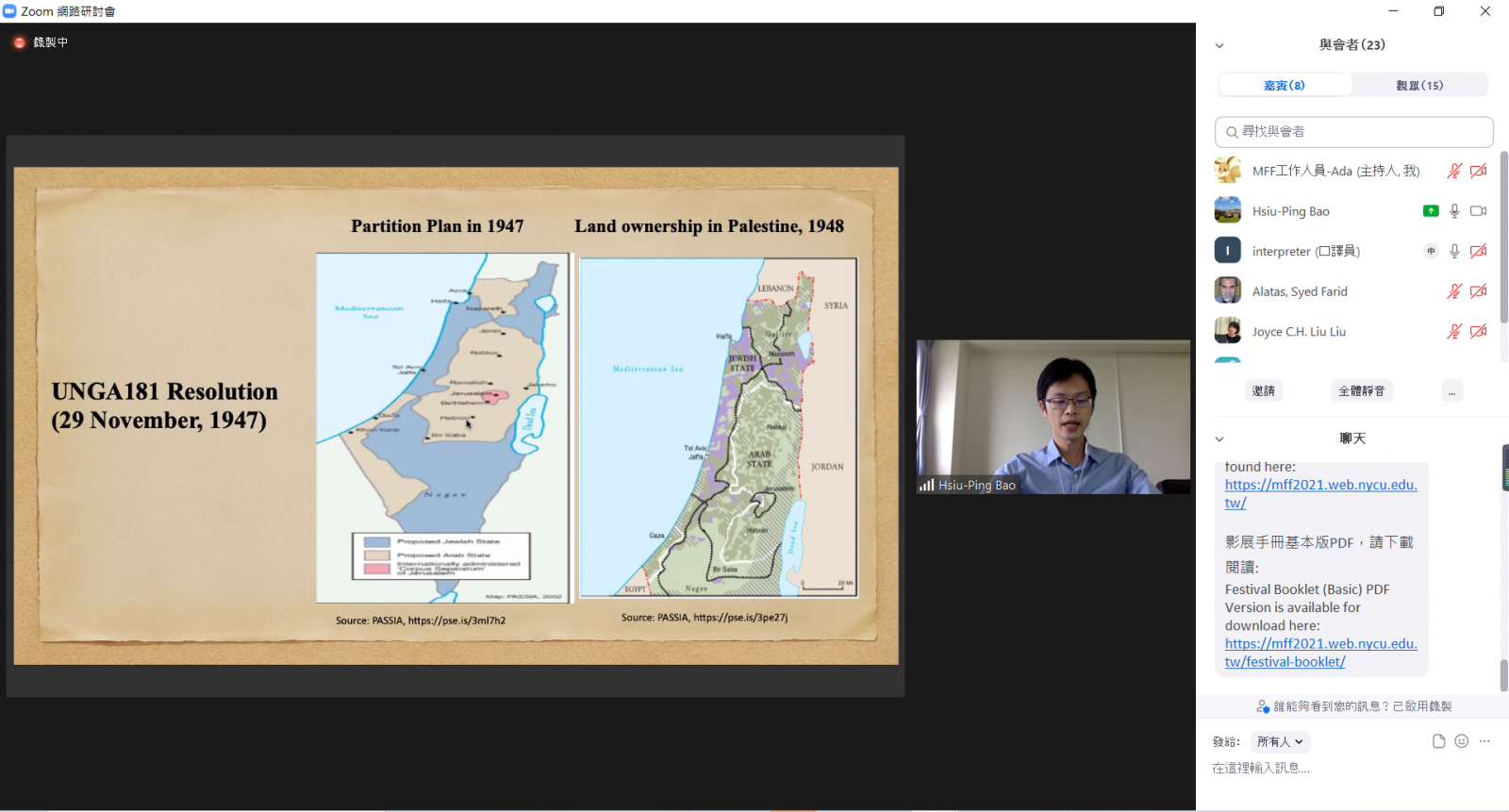
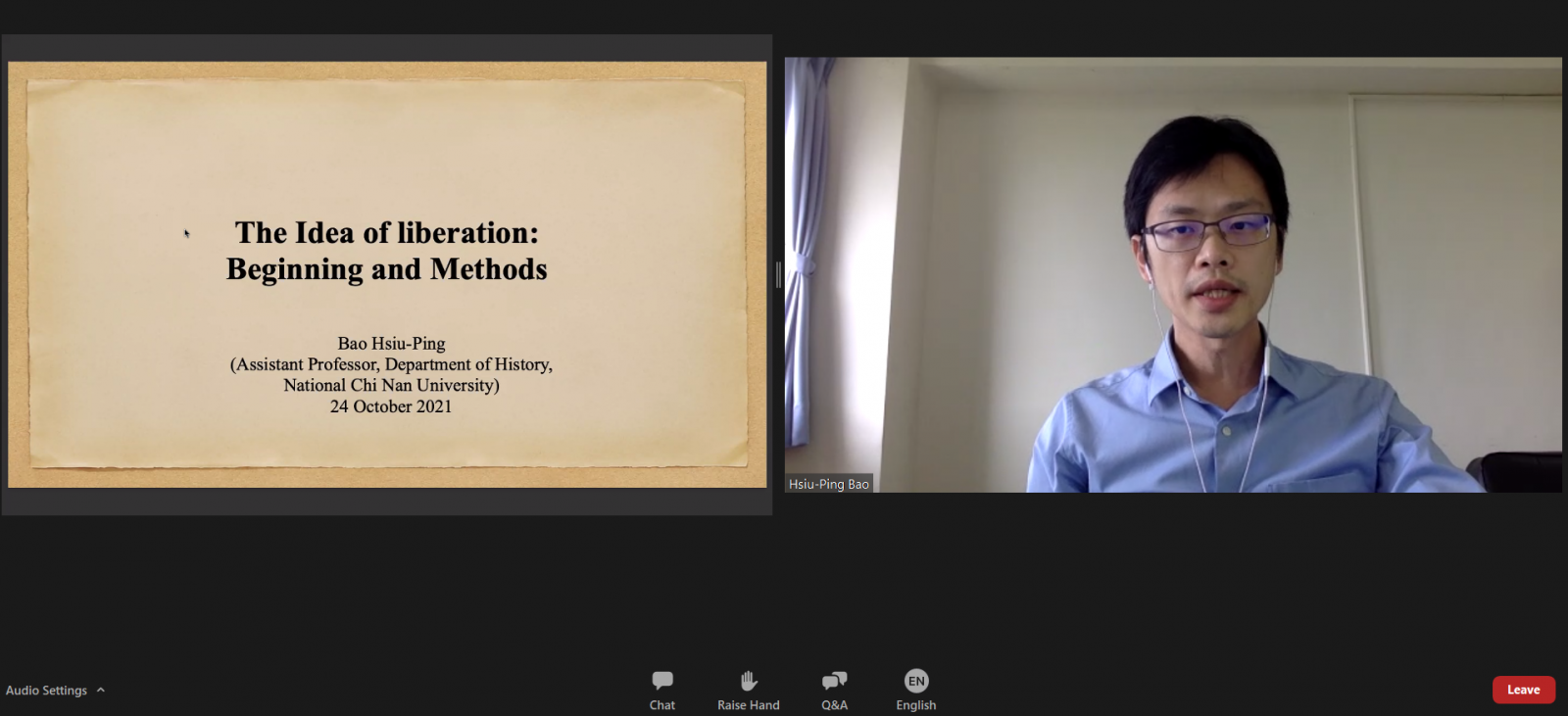
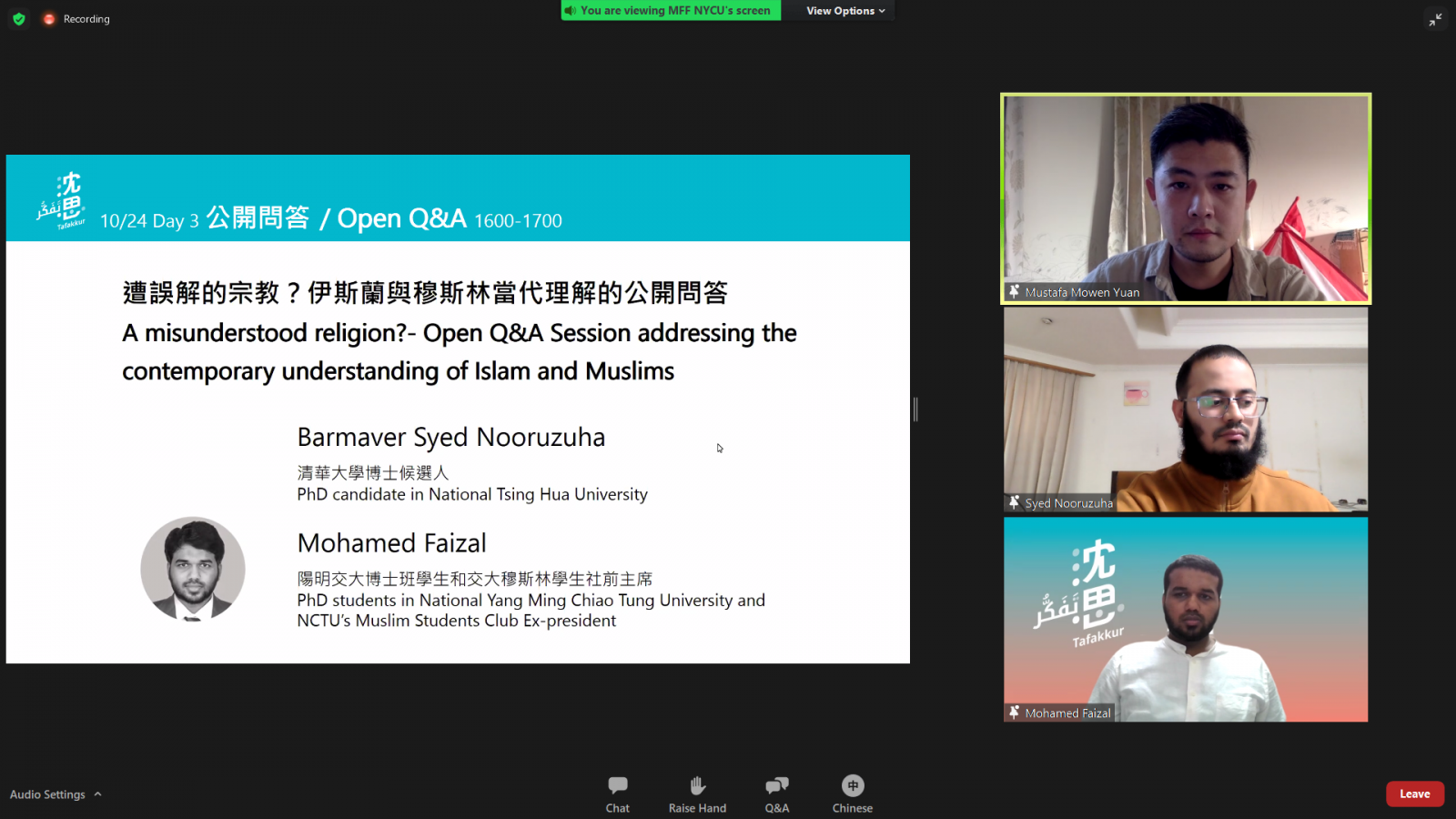
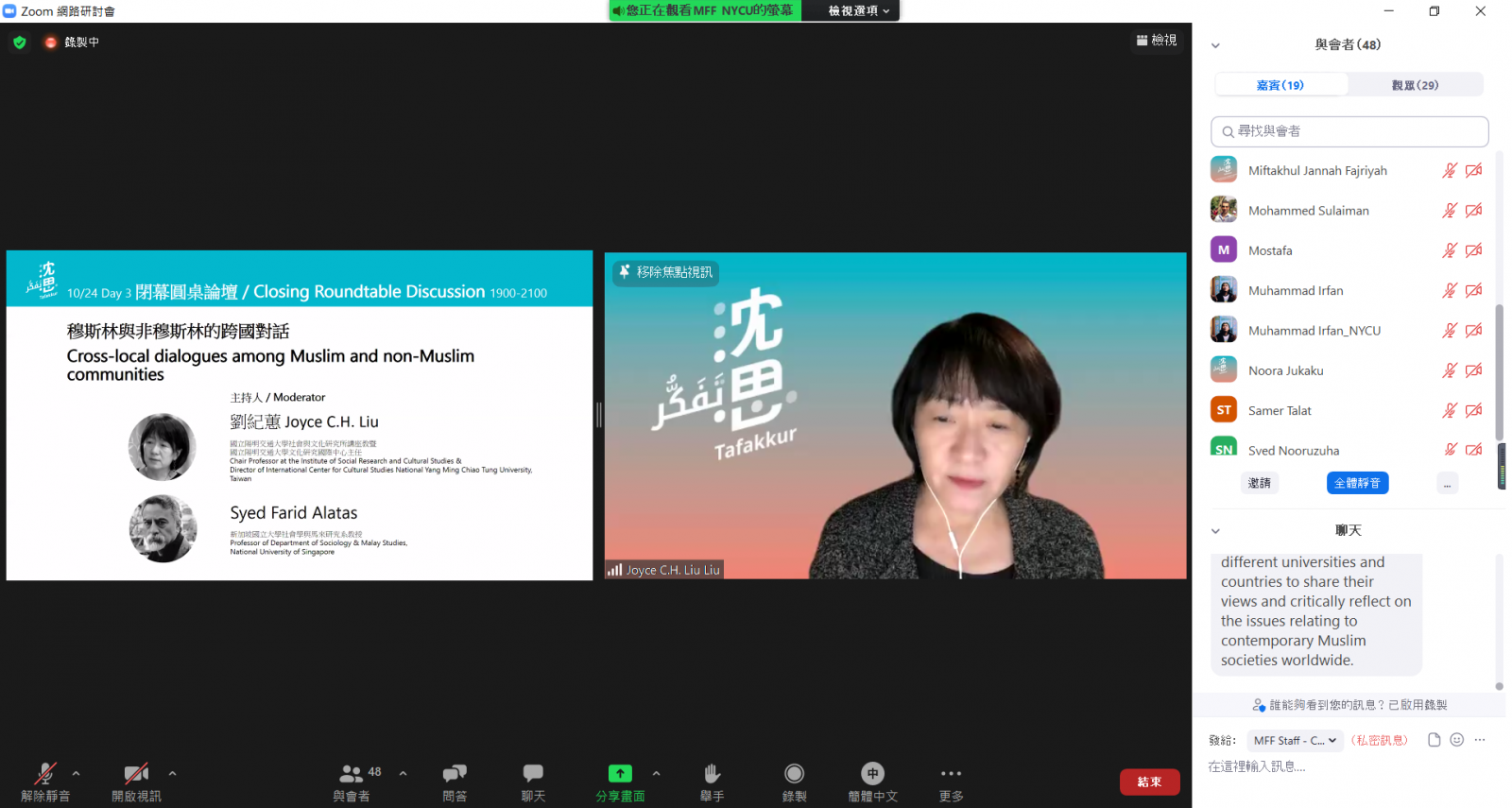
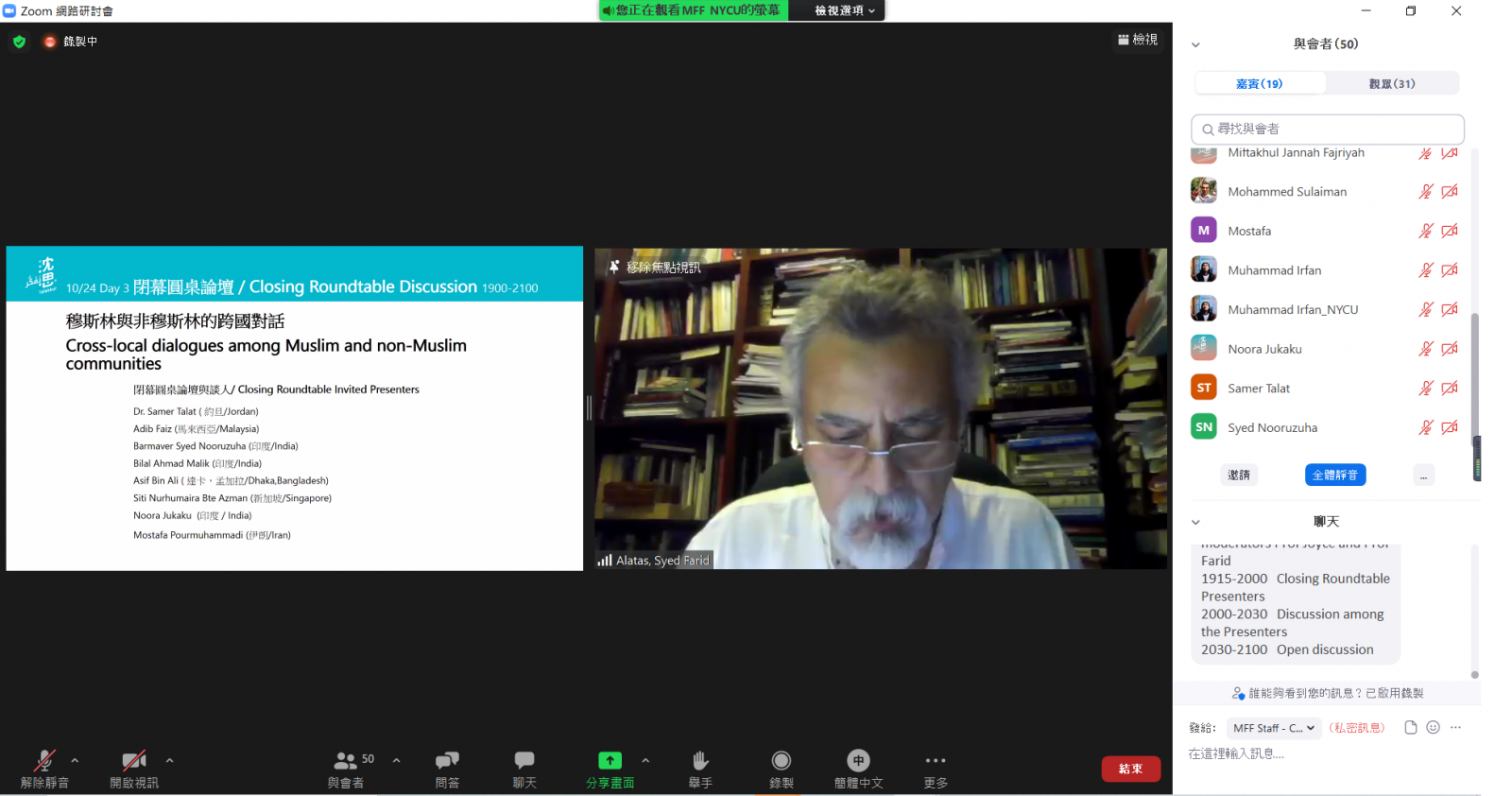
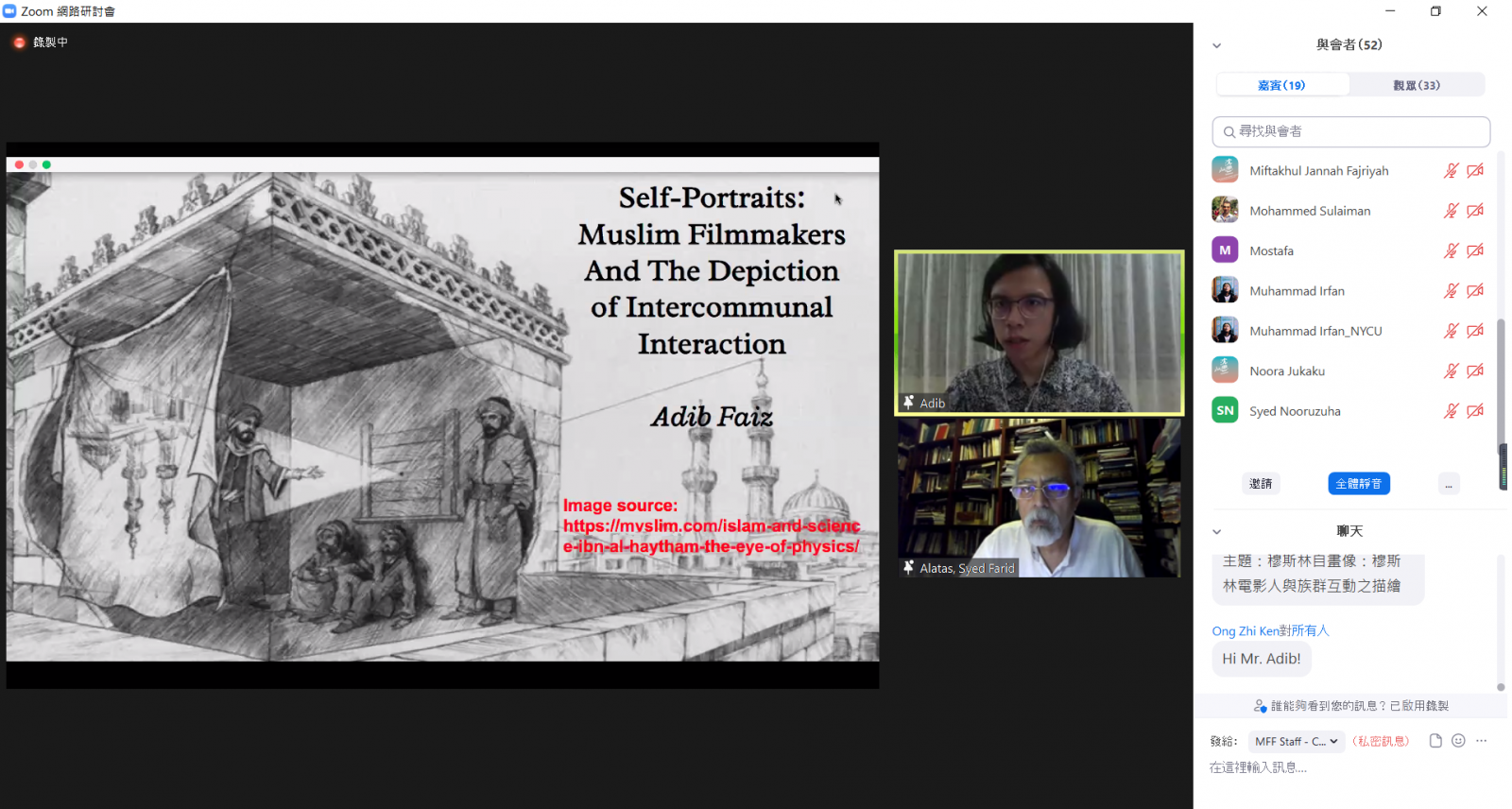
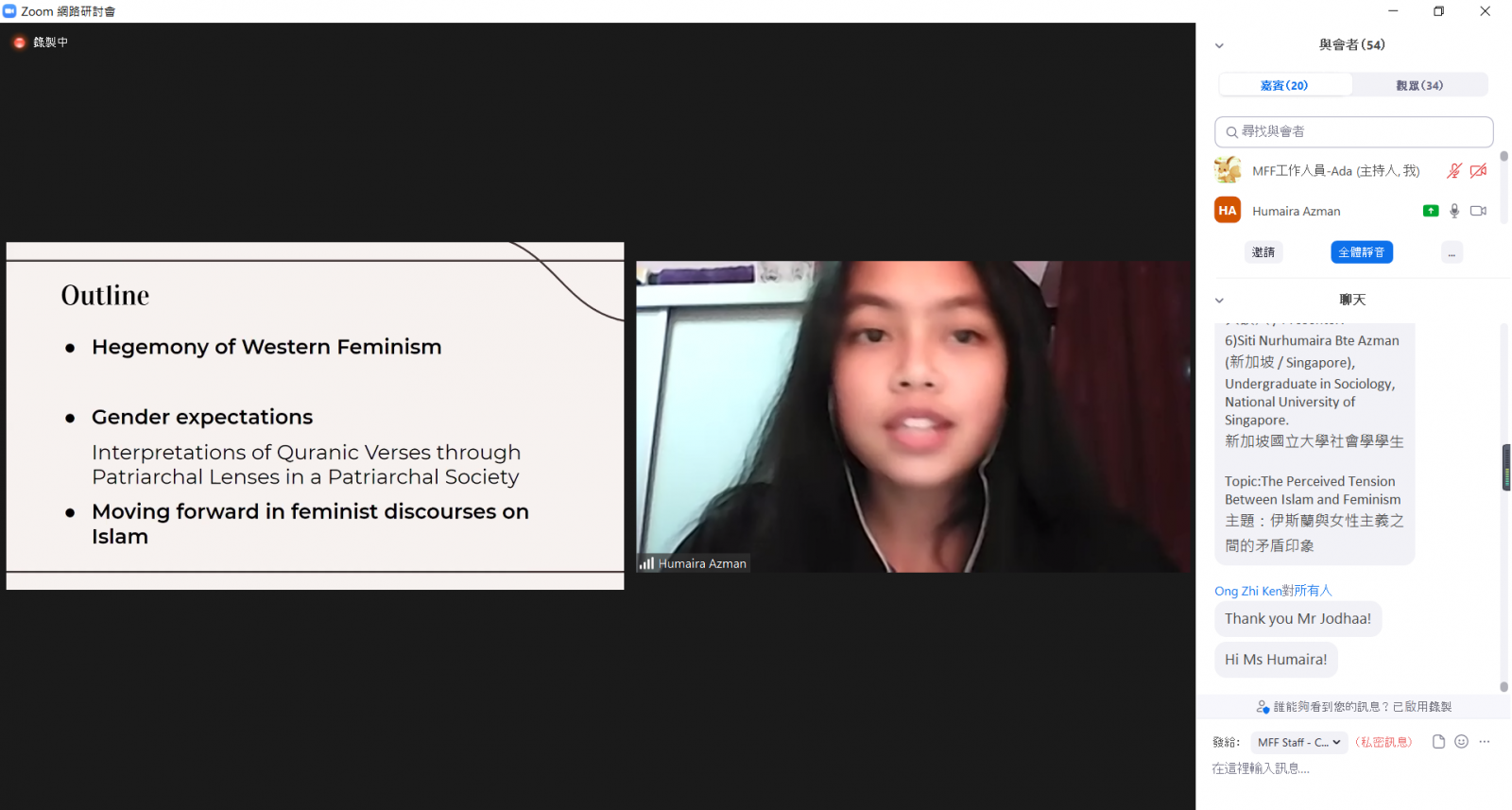
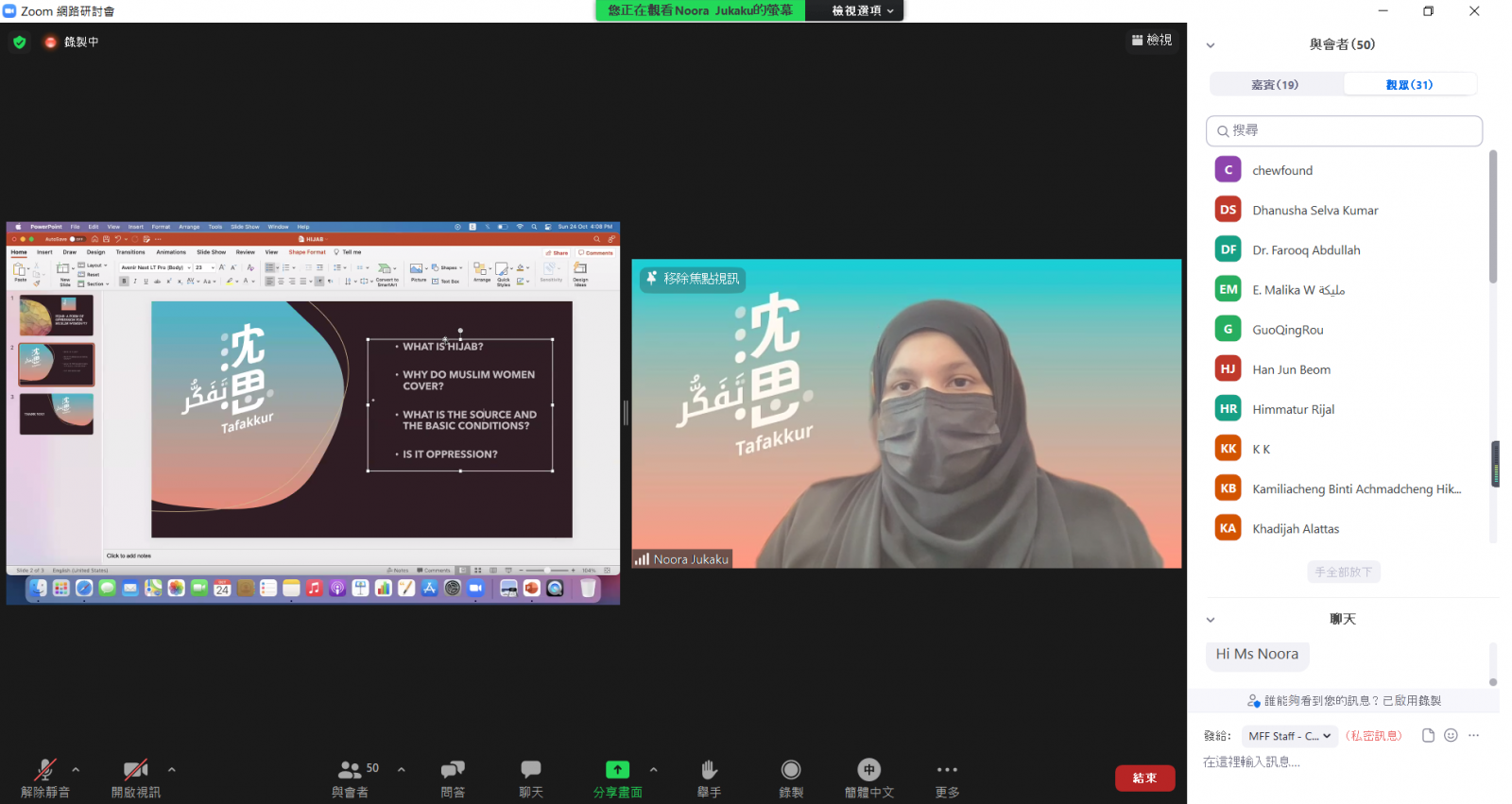
近期新聞 Recent News


Report|Conceptualizing Digital Governance in the Age of Semiconductors: A Critical Review of Keywords and Concepts
2025-12-03
more
Report| Book Launch: Nyanyian di Perantauan: Kumpulan Lirik Lagu Pekerja MigranIndonesia & Laporan Skena Musik di Taiwan 2024
2025-11-22
more